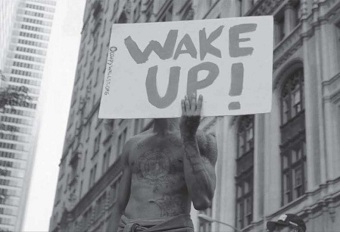The Politics of Theft: Economic Inequality and the Forgotten Work Force
The Politics of Theft: Economic Inequality and the Forgotten Work Force
Heist:
Who Stole the America Dream?
a documentary by Frances Causey and Donald Goldmacher, 2012
The New Jim Crow:
Mass Incarceration in the Age of Colorblindness
by Michelle Alexander, 2010

By now, most leftists and much of mainstream America are familiar with the story of what Representative Donna Edwards calls “the greatest wealth transfer in the history of American kind if not of mankind.” They are not so familiar with the latest “great migration,” the forced transfer of millions of men (and more and more women) of color out of their communities and into prisons.
Two recent works illustrate the dilemmas of both and point to the need to link these phenomena. Frances Causey and Donald Goldmacher’s somewhat melodramatic documentary Heist: Who Stole the American Dream? tells the story of modern-day robber barons, now known as the 1%. It does an excellent job of showing how the 1% amalgamated its wealth over the past forty years. Yet, to truly understand the current dilemma of America’s 99%, we must add the puzzle pieces that Heist doesn’t include, those of race and mass incarceration. For that story, we must turn to Michelle Alexander’s The New Jim Crow and connect the dots. But first, the great robbery.
Undermining the House of Labor
In a letter written in 1971, Lewis Powell, then an attorney and later a U.S. Supreme Court justice, detailed for the U.S. Chamber of Commerce a strategy for U.S. corporations to become more aggressive in shaping law and the political system to serve their interests. The makers of Heist, Causey and Goldmacher, refer to this memo as a “battle plan” for corporate America. They cite the motivation behind this “battle” as the need to respond to the social movements of the sixties, which destabilized the agenda of corporate America.
Although Powell’s ideas did percolate through corporate corridors in the 1970s, and the airline industry was deregulated under Jimmy Carter, it was only with the advent of the Reagan administration that they found a public champion. By now much of Reagan’s deregulation of the economy is well known: the dismantling of the regulatory power of the Securities and Exchange Commission, the Environmental Protection Agency, and the Occupational Safety and Health Administration.
Heist frames this transformation not simply as a greedy quest for wealth but rather as a directed offensive against the power of organized workers. As Jeff Faux, founder of the Economic Policy Institute, tells viewers, “the target of Reaganomics was the labor movement.” Catalyzed by Reagan’s destruction of the air traffic controllers’ union, the transfer of wealth detailed by Heist not only increased the ratio of CEO to worker salaries from 42 to 1 in 1980 to 18...
Subscribe now to read the full article
Online OnlyFor just $19.95 a year, get access to new issues and decades' worth of archives on our site.
|
Print + OnlineFor $35 a year, get new issues delivered to your door and access to our full online archives.
|






